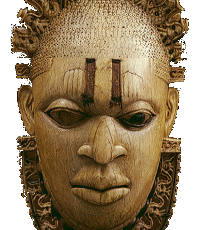Libraries of Timbuktu
Timbuktu was established as a center of Islamic learning during the Mali empire in the thirteenth-century CE but the town continued to flourish well into the seventeenth-century. Scholars, teachers and students assembled at the madrasah – the religious school – at the Sankore mosque. We might, if we like, call it a “university.” [Read more: “Nalanda, a very old university“] In addition, Timbuktu was at the center of the book trade across the Sahara. Books were bought and sold here and many of the town’s inhabitants were avid book collectors. The books were written in Arabic, but also in a number of indigenous languages, using Arabic script. It is simply not true, as it sometimes is claimed, that Africa had no written languages before the Europeans turned up.
The inhabitants of Timbuktu have remained book lovers to this day. Many of the old families in the town are proud owners of large collections. It has been estimated that Timbuktu has some 700,000 books. However, since the manuscripts are fragile and often in a bad condition, the owners have been encouraged to deposit them in libraries where they can be better preserved but also digitalized and put on the Internet.
In April 2012, Timbuktu was captured by Tuareg rebels in collaboration with Al-Qaeda forces and declared the town a part of the independent country of Azawad. [Read more: “Independence for Azawad“] They outlawed music, football, and destroyed a number of shrines dedicated to Sufi saints. They also began destroying ancient books. On January 25, 2013, the rebels entered one of Timbuktu’s libraries, swept manuscripts off the shelves, poured gasoline on them and set them alight. By then, however, the vast majority of the books had already been saved thanks to the heroic efforts of a few librarians who had smuggled hundreds of thousands of books out of the town.
The preservation and digitalization project is now proceeding apace, funded by South Africa and various international foundations. However, many families are understandably reluctant to part with their treasures. So far only a fraction of the texts have been put on the internet. It is only when the digitalization is completed that we can properly begin to understand the intellectual world of medieval West Africa.
External links
- A Timbuktu book collector between the Mediterranean and Sahel
- Abderrahmane Sissako, Timbuktu, 2014. Official trailer.
- Dennis Kostick, “Salt”
- Library of Congress, “Islamic manuscripts from Mali”
- Library of Congress, "Ancient Manuscripts from the Desert Libraries of Timbuktu"
- LiveScience, “Timbuktu: History of Fabled Center of Learning”
- Memory of the World
- Mental Floss, “The great library rescue of Timbuktu”
- Muslim Heritage: “University of Sankore, Timbuktu”
- The Guardian, "‘Jihadists were going to burn it all’: the amazing story of Timbuktu’s book smugglers"
- The Guardian, "Mokhtar Belmokhtar: the 'uncatchable' chief of Africa's Islamic extremists"
- The Guardian, "War crimes court orders Mali radical to pay €2.7m for Timbuktu rampage," August 18, 2017
- The Story of Africa, “The Berbers of North Africa”
- Timbouctou Manuscript Project
- Time, “Mali: Timbuktu Locals Saved Some of City’s Ancient Manuscripts from Islamists”

